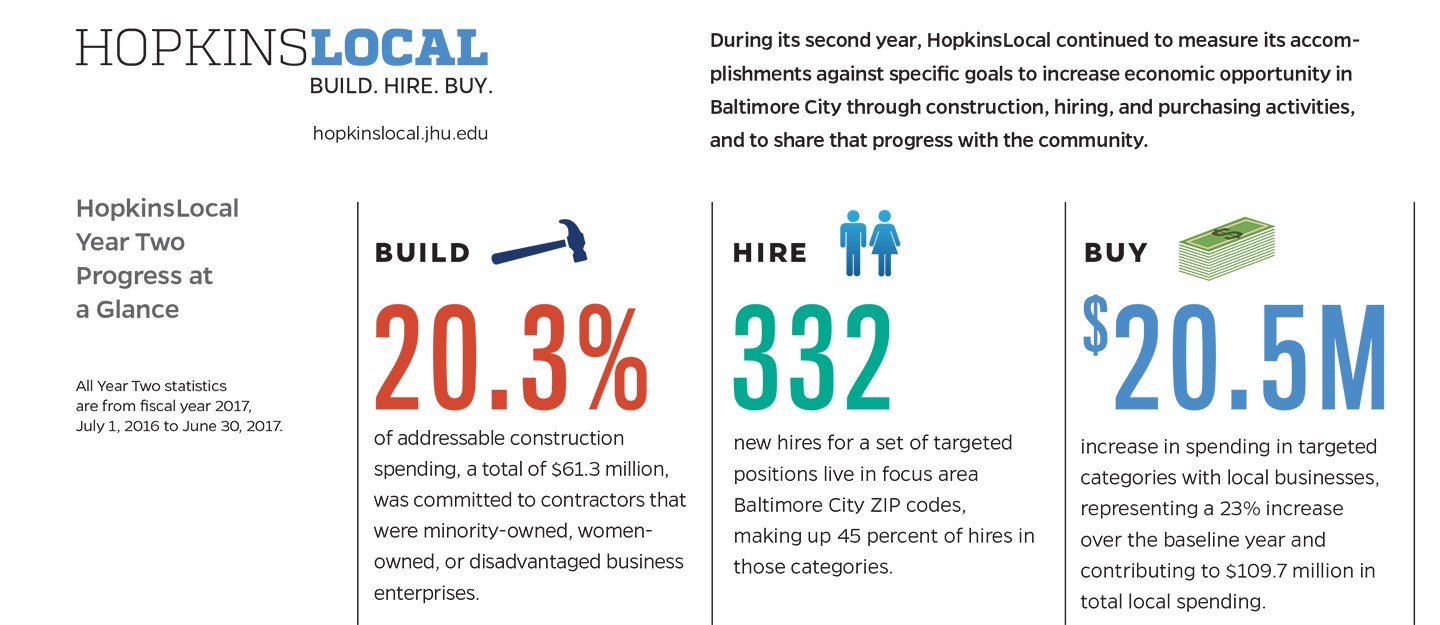Johns Hopkins University issued the following announcement on May 9.
It pays to be a business in Baltimore. That's the message that Johns Hopkins wants proprietors and their patrons to know as part of the institution's HopkinsLocal initiative to support and invest in local enterprises.
A new progress report on the institution's initiative to help strengthen the city's economy shows that Johns Hopkins exceeded goals it set two years ago to steer more construction and design contracts to minority- and women-owned businesses and disadvantaged businesses.
According to the progress report, $61.3 million, or 20.3 percent, of the university and health system's construction spending was committed to minority-owned, women-owned, or disadvantaged business enterprises in fiscal year 2017, exceeding the 20 percent the institution initially pledged to direct to the underrepresented businesses by fiscal year 2019.
In the buy category, Johns Hopkins boosted spending with local businesses by $20.5 million, or 23 percent, for a total of $109.8 million—a significant increase from the $89.3 million the institution steered towards these enterprises in 2014, the year it started tracking these goals.
Johns Hopkins University and the Johns Hopkins Health System reported equally impressive results in their effort to hire more city residents and direct more of their purchasing dollars toward local vendors than they did in the first year of the initiative. In its pledge to employ more local residents, Johns Hopkins reported hiring 332 Baltimoreans from city neighborhoods with high poverty and unemployment rates, and from areas around Johns Hopkins campuses, into targeted entry-level positions. The new hires accounted for 45 percent of the 739 total hired into targeted positions in fiscal year 2017. This is an increase from fiscal year 2016, where 304 of the 710 targeted entry-level positions, or 43 percent, were filled from these focus areas.
"We launched HopkinsLocal to do more to build, hire, and buy locally, creating meaningful and lasting opportunities for residents and businesses in our city," said Ronald J. Daniels, president of Johns Hopkins University. "The progress made in our second year helps to demonstrate the foundational commitment beneath our goals."
The university and health system further enhanced their reach locally with 17 small or minority- and women-owned and disadvantaged constructions businesses, expanding their skills and connections to Johns Hopkins through BLocal BUILD College.
Kevin W. Sowers, president of the Johns Hopkins Health System and executive vice president of Johns Hopkins Medicine, said that while progress is strong, the work is not complete.
"We are thrilled with the progress we've made to help improve the economic state of our city," Sowers said. "But the reality is there is much more we can and will do as an anchor institution in Baltimore City."
Launched in 2015 to help promote economic growth and inclusion in Baltimore, HopkinsLocal is a three-year initiative created to serve as a guide as the university and health system seek to secure more design and construction and procurement contracts with businesses that may not have the access to Johns Hopkins that larger or more connected companies have.
The institution further pledged to hire more city residents living in distressed areas of the city for targeted entry-level positions on both the university and health system campuses. Examples of these positions include medical assistant, lab worker, and administrative secretary on the university side, and patient services coordinator, certified nursing assistant, and community health worker on the health system side.
As part of HopkinsLocal, the institution also hired 138 citizens returning from incarceration in FY 2017—eight at the university and 130 at the health system. Of the 138, 44 were hired into targeted entry-level jobs from struggling city neighborhoods.
The institution committed to increasing spending with targeted businesses by expanding outreach to those businesses and supporting Johns Hopkins' internal purchasing efforts by, for example, creating a directory of pre-screened vendors from which to purchase goods and services.
As HopkinsLocal nears the end of its third year this summer, university and health system leaders said they are determined to be even more ambitious in their goal to ensure a sustained focus on the city's economic outlook. Although it was announced as a three-year effort, Hopkins leaders are working to develop additional goals for fiscal year 2019 as they continue to harness the institution's economic activity to advance economic growth and employment in Baltimore.
Original source can be found here.

Source: Johns Hopkins University


 Alerts Sign-up
Alerts Sign-up